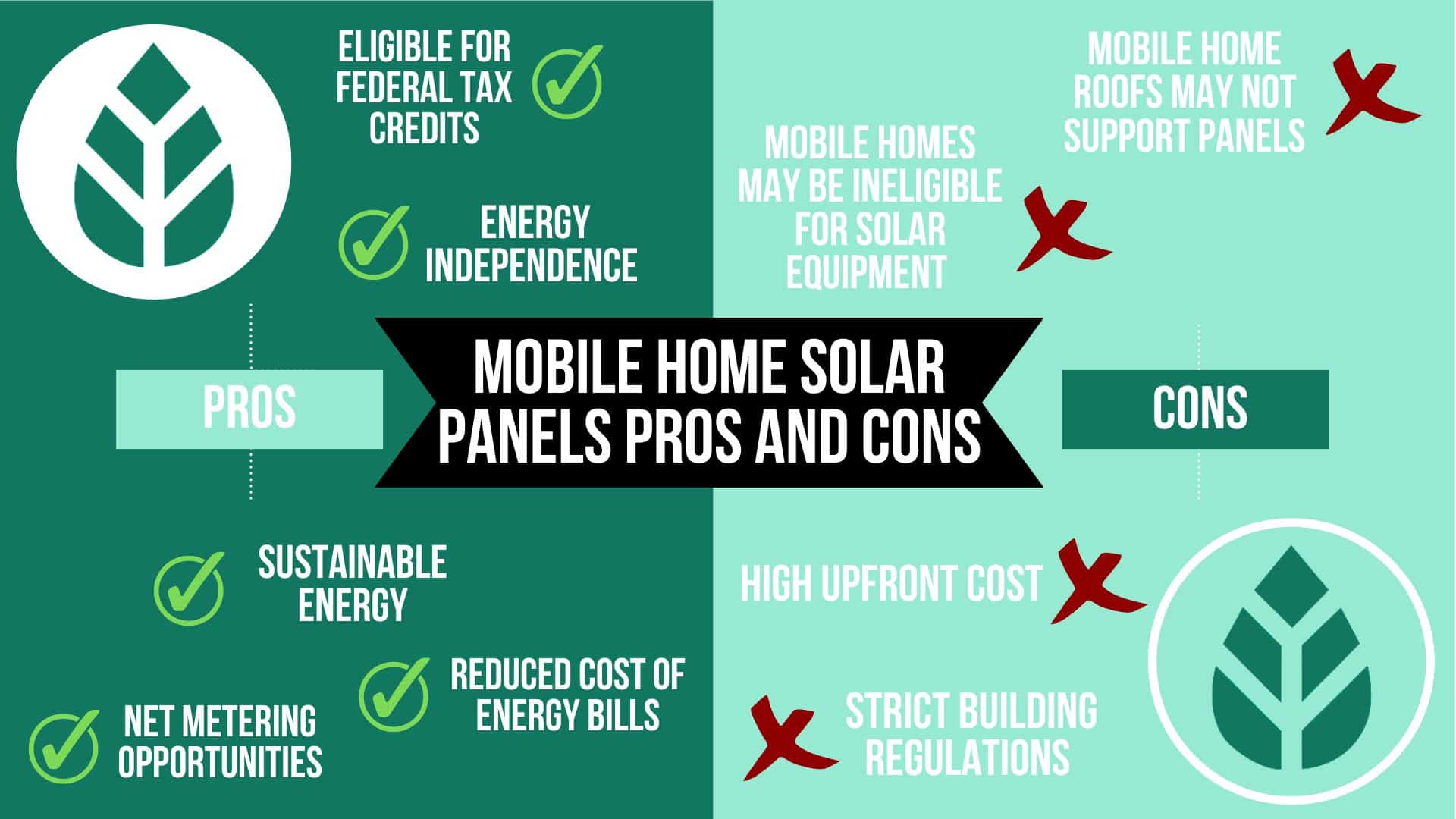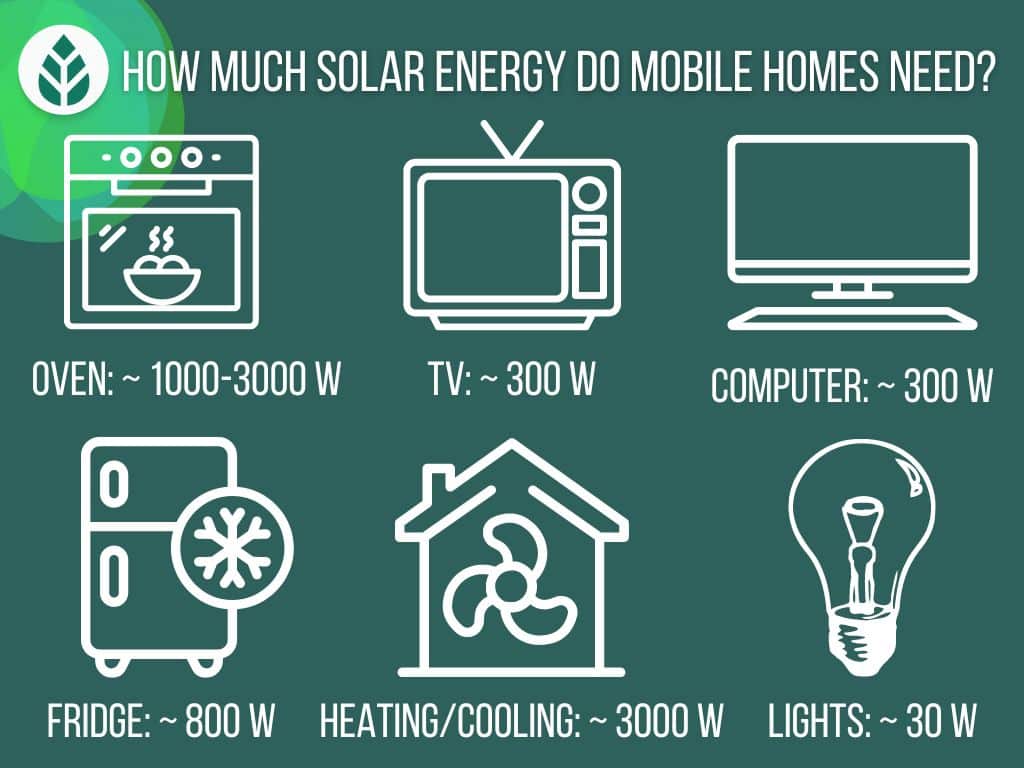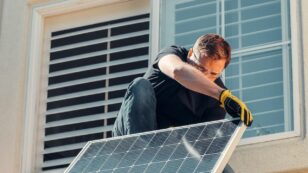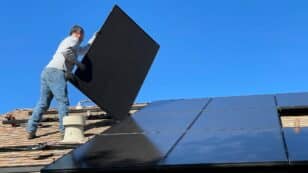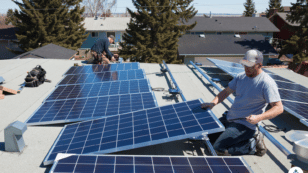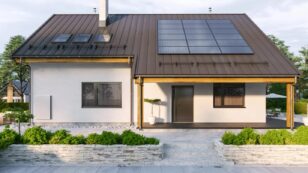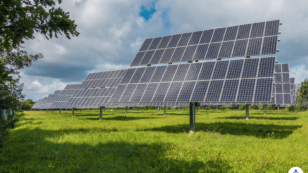 Reviews
Reviews
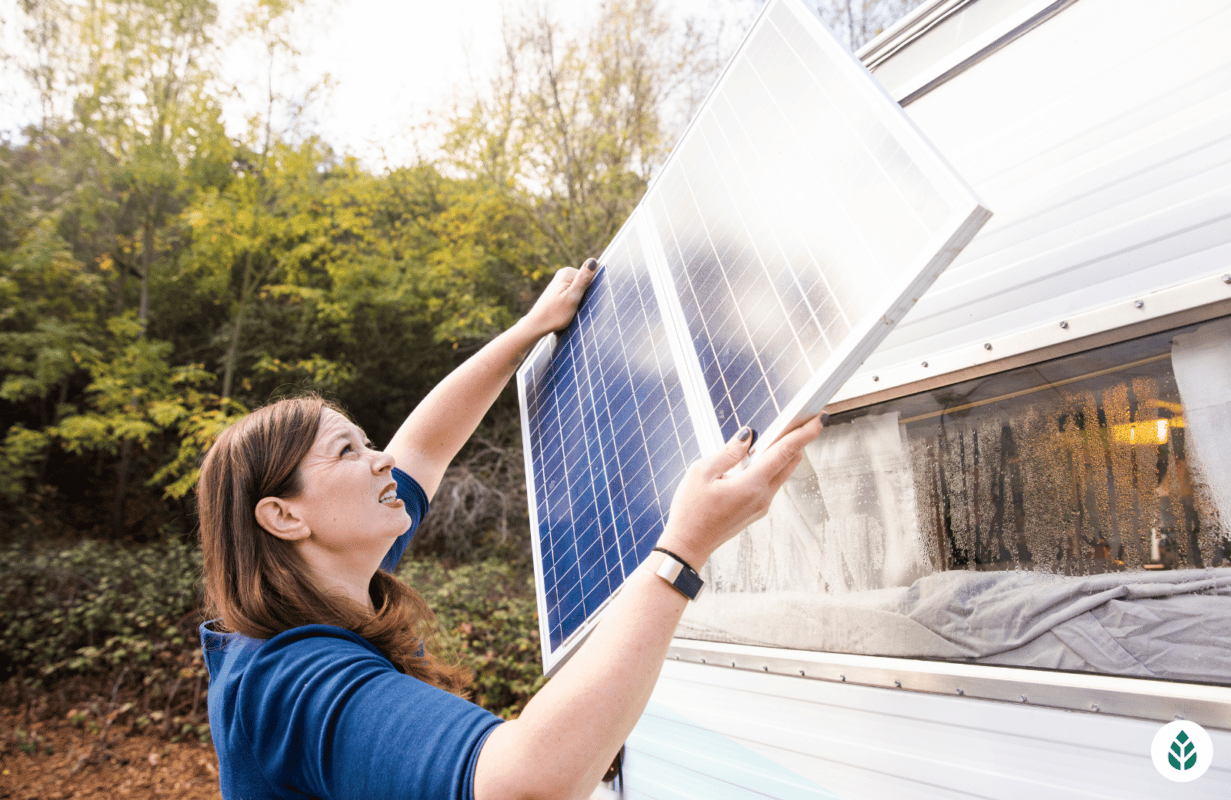
7 Best Solar Panels for Mobile Homes (2024 Guide)
Here’s what we will cover in this guide:
- What solar panels are best for mobile homes
- How to know if your mobile home can use solar panels
- Where to install solar panels for mobile homes
This guide has helped thousands of mobile homeowners choose the right solar panel for their home, which saves them time and money in the process.
Each product and or company featured here has been independently selected by the writer. You can learn more about our review methodology here. If you make a purchase using the links included, we may earn commission.
As more homeowners turn to solar as a way to generate their own green energy, it’s no wonder that mobile homeowners also want to hop on the sustainability train. However, not all mobile homes can support full solar power systems. In many cases, mobile home owners turn to thin-film panels, which are less powerful but far lighter, making them suitable for mobile home solar arrays.
Compare the Best Solar Panels for Mobile Homes
Despite their compact size, mobile homes are some of the most inefficient structures around. Compared to single-family homes, mobile homes use 50% more electricity per square foot and use about 28% more energy than other dwellings1. This is, in large part, because the insulation and building materials used are more sparse and less insulative overall.
Much of this inefficiency can be attributed to a lack of energy-efficient upgrades, but homeowners still look for ways to combat their steep energy bills. Are solar panels the answer? Below are some of the panels we believe are best suited for mobile home solar applications.
Solar Panel Product |
Price |
Warranty |
Efficiency rating |
| ACROPOWER Solar Kit | $542 | 1 year | 24% |
| ECO-WORTHY 200 Watt 12 Volt Complete Solar Panel Starter Kit | $699 | 1 year | 21% |
| Renogy 300 Watts Solar RV Kit | $507 | 10 years | 22% |
| Renogy Flexible Solar Panel 175 Watt | $350 | 25 years | 23% |
| Renogy 6pcs Solar Panel Kit 320W 24V Monocrystalline Off-Grid | $2,339 | 2 years | 21% |
| ECO-WORTHY 1200W Complete Solar Panel Kit | $2,939 | 1 year | 21% |
| HQST 100W 12V Flexible Monocrystalline Solar Panel | $147 | 25 years | 23% |

Blue Raven Solar
Pros
- Industry-leading in-house financing
- Competitive pricing
- Excellent reputation
Cons
- Doesn't offer solar batteries (coming 2022)

Blue Raven Solar
Pros
- Industry-leading in-house financing
- Competitive pricing
- Excellent reputation
Cons
- Doesn't offer solar batteries (coming 2022)
7 Best Solar Panels for Mobile Homes
You can work with solar companies that install mobile home solar panels, but there are also some solar panels that you can purchase and install yourself. Let’s look at some of the different types of solar panels for mobile homes.
ACROPOWER Solar Kit
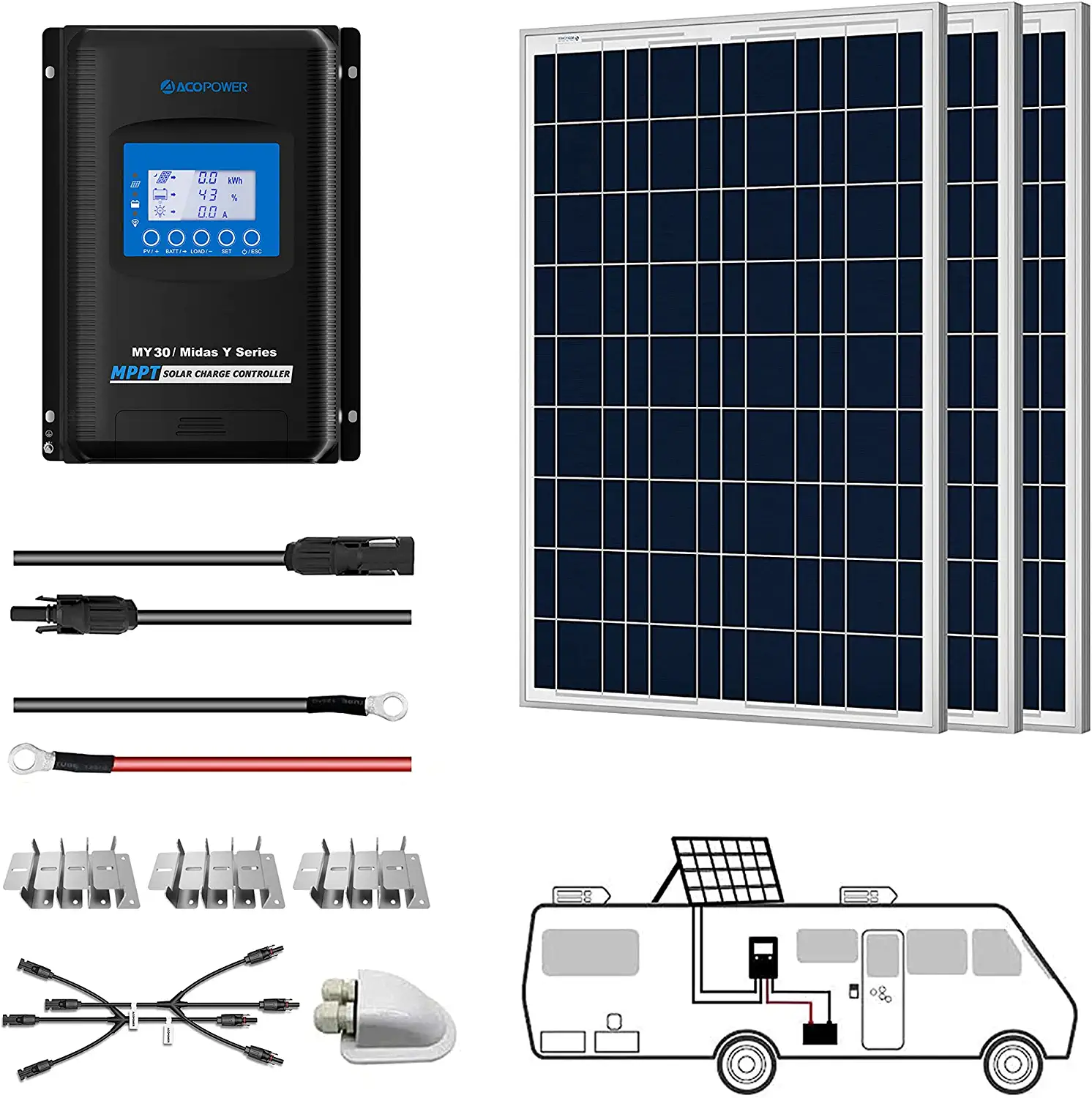
- 300W/12V polycrystalline solar panel kit
- 20.6 pounds per panel
- Up to 24% efficiency
- 25 year power-output warranty and 1-year kit warranty
Pros:
- Excellent efficiency rating
- Great warranty
- 30A MPPT controller included
- Easy installation
- Lightweight panels
Cons:
- No battery or inverter included
- Will need to purchase multiple kits
These lightweight solar panels make the transition to solar energy easy. They can be used for outbuildings, RVs, cabins, sheds and mobile homes alike and make the perfect backup for the inevitable power outage. The upfront fees of these panels is within the competitive range, but those who want complete energy independence will need to purchase multiple kits.
Acropower claims to have achieved 24% under lab conditions, but a more realistic efficiency rating is likely between 20% and 22% according to user reviews. This efficiency rating still places Acropower among other highly efficient panels.
It’s worth noting that these panels come with a controller that saves you money on buying additional equipment, but it doesn’t include a battery. Unless you’re just looking for backup power for your mobile home in sunny conditions, you’ll also need to invest in some solar batteries. These will cost you an additional $250 to $1,000, in most cases.
Additionally, keep in mind that these panels, while efficient, are quite heavy. You might need to limit the number you install based on what your mobile home can support, which means you might not be able to get the same power output from a complete system as you would if you used lighter panels with a similar efficiency.
ECO-WORTHY 200 Watt 12 Volt Complete Solar Panel Starter Kit
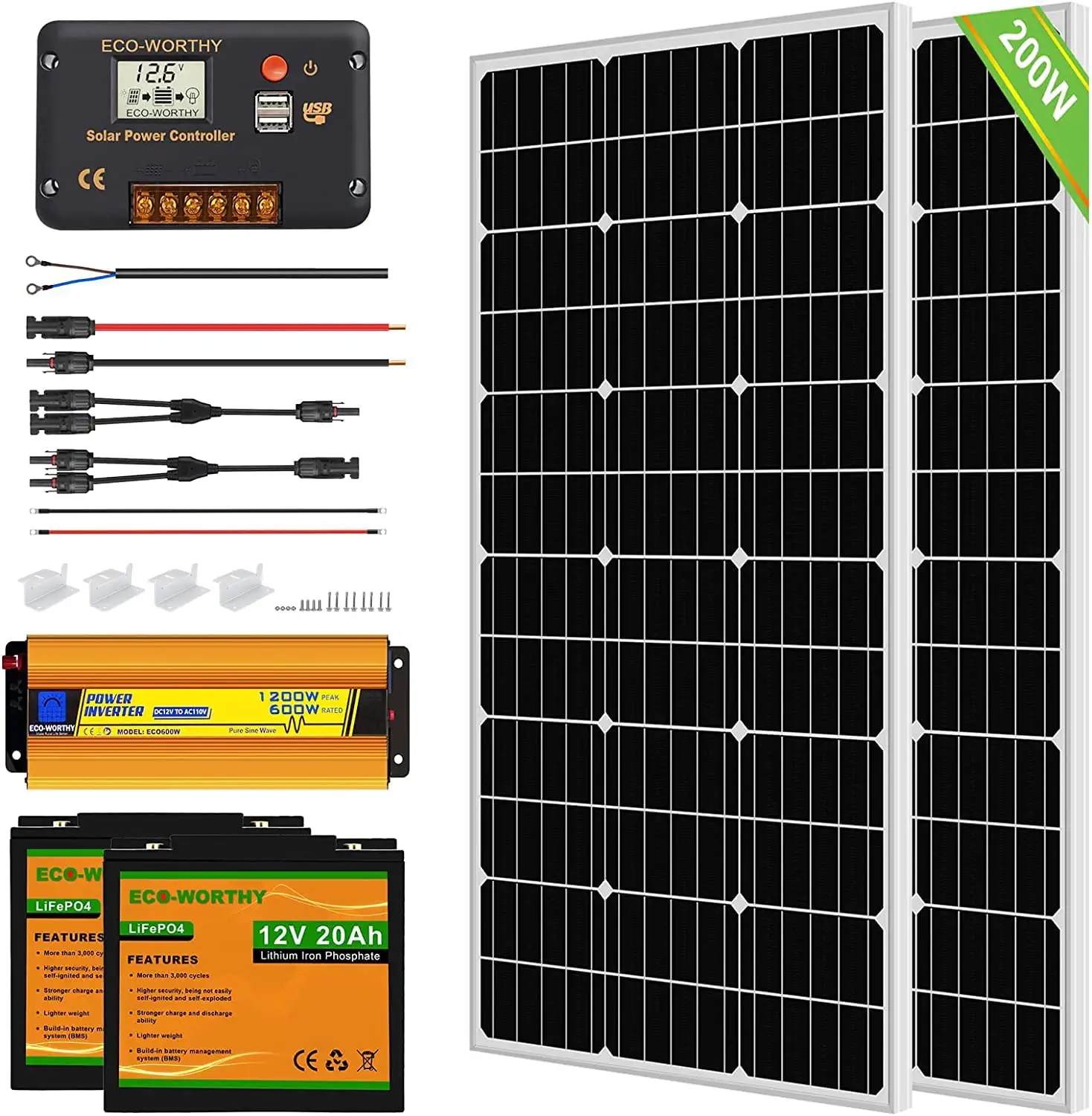
- 200W/12V panel kit
- Up to 21% efficiency
- 13.14 pounds per panel
- 1-year warranty
Pros:
- Lightweight panels
- High efficiency ratings
- Easy solar panel installation
- 30A charge controller included
- 2 20AH batteries included
- 600W solar inverter included
Cons:
- Lower wattage panels
- Shorter warranty
- Will need to purchase multiple kits
This affordable Eco-Worthy kit comes complete with two solar batteries, a charge controller, a solar inverter and two solar panels. With high efficiency ratings and easy installation, this is the ideal kit for DIYers. Because these panels are so lightweight, they can be safely mounted on the roof of your mobile home.
Perfect for powering LED lights, outdoor string lights or a mini fridge, these solar panels can help cover your electricity needs. Homeowners looking to rely completely on solar energy to offset their energy bills will need to purchase more than one of these solar panel kits.
This kit includes batteries, which is ideal for mobile home set ups, which tend to be off-grid. However, you might need to invest in additional batteries for full power. The 40 amp-hours you get will run an RV air conditioner for about a half hour, a mini fridge for around 20 hours, or LED lights for several days, all without any additional power coming in from your panels. To run multiple appliances or HVAC equipment, you’ll likely need to upgrade.
Renogy 300 Watts Solar RV Kit
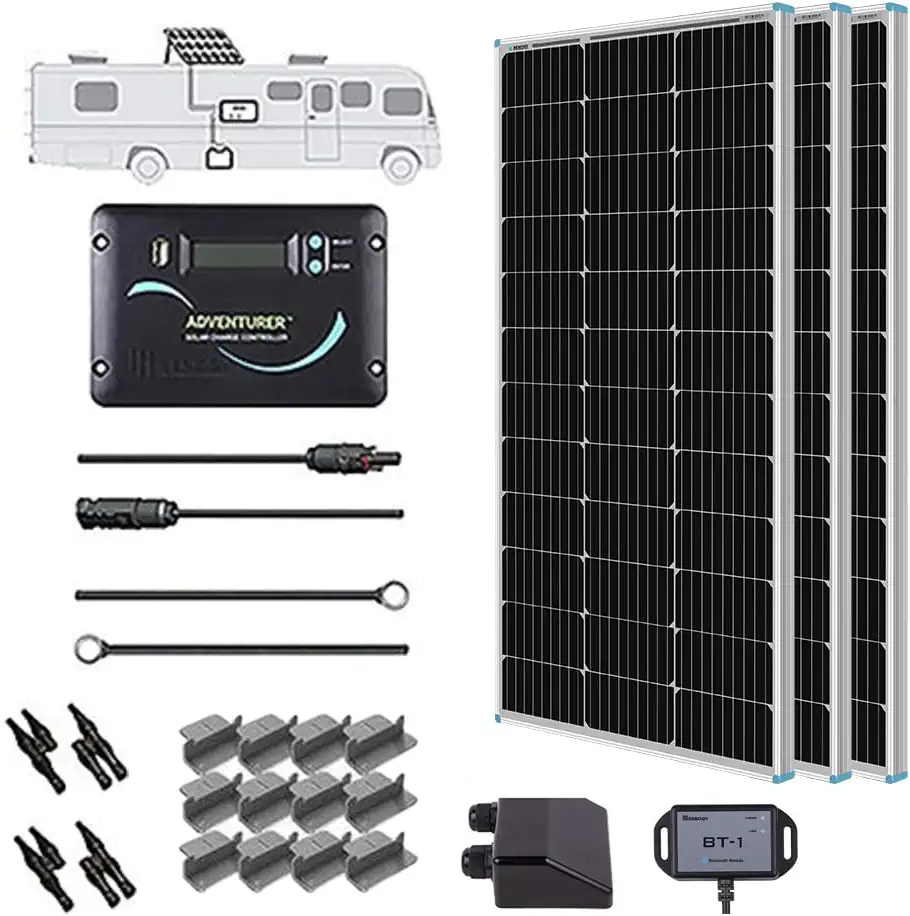
- 300W/12V panel kit
- Up to 22% efficiency
- 66 pounds for 3 panels
- 10-year warranty
Pros:
- Easy solar installation
- 30A charge controller included
- Designed for flat-mounting
- Lightweight panels
- Competitive price point
Cons:
- Battery not included
- Will need multiple kits
Designed for off-grid RV, boat, caravan and cabin use, these solar panels are great for those new to solar energy. The panels are lighter than traditional panels but are able to withstand high winds and heavy snow. Unlike some solar panels that require slanted roofs for installation, these Renogy panels can accommodate the flat-roof structures often seen in mobile homes.
Renogy solar modules come in 300W kits, so those who want complete energy independence will need to purchase multiple kits. Battery backup is also not included in this kit but can be purchased separately.
At 22 pounds per panel, these are some of the heaviest available for DIY installation. Just keep in mind the structural limitations of your mobile home, and plan accordingly. If you have a home that won’t support much, you might want to opt for lighter panels or consider a ground-mount set up for these.
Renogy Flexible Solar Panel 175 Watt
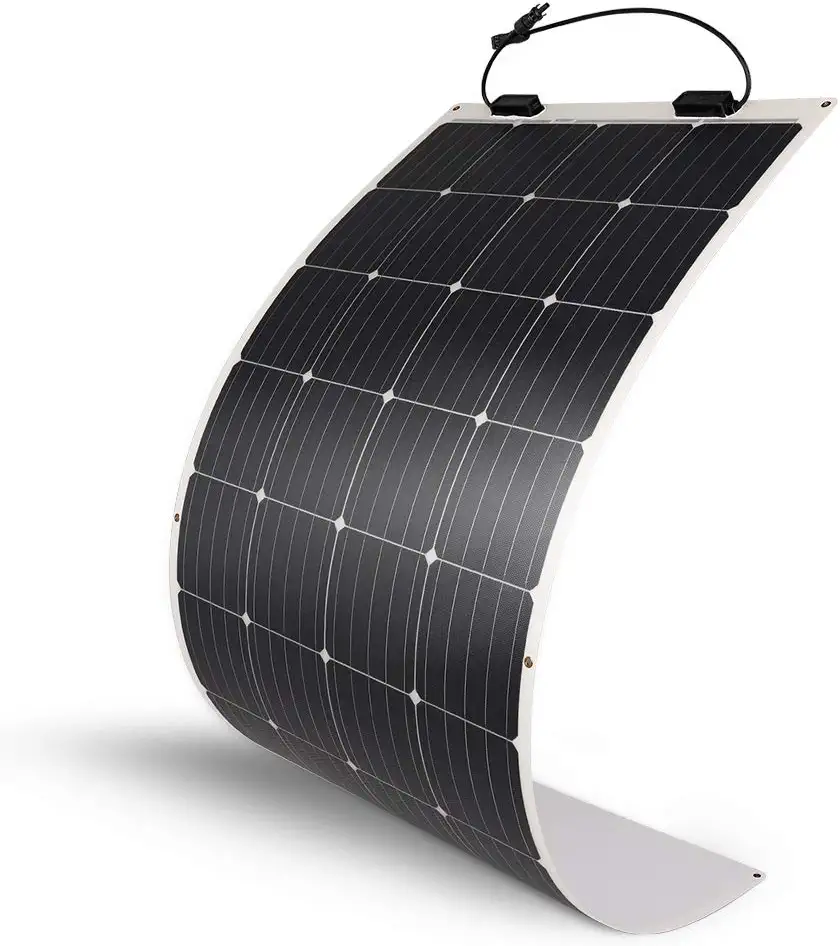
- 175W/12V solar panel
- 6.2 pounds per panel
- 17.3% efficiency rating
- 25-year performance warranty
Pros:
- Ideal for uneven and curvy surfaces
- 70% less weight than conventional panels
- 95% thinner than traditional solar panels
- Excellent performance warranty
- Competitive price point
Cons:
- Lower efficiency rating
- No inverters, wiring or batteries included with panels
Renogy’s 175W solar panel offers a new type of flexibility. With panels that are able to bend to the shape of your mobile home, these PV modules are great for all surfaces. At less than a tenth of an inch thick, the super thin lamination also makes these panels virtually undetectable as well as extremely lightweight. This is our favorite flexible solar panel. Although there are other flexible solar panel options, the price point on this one is hard to beat.
The major downside to these panels is the lower efficiency rating, but keep in mind that flexible thin-film panels will almost always have lower efficiency ratings than monocrystalline and polycrystalline panels. This does mean you might have to invest in more panels than you otherwise would, but it might be the only option you have if you own a mobile home with a curved roof.
They’re also inefficient in the heat since they’ll transfer some heat into your home if attached directly to your roof. However, they’re extremely lightweight and come with a 25-year warranty.
Lastly, we only recommend these panels if you have some experience with DIY solar installation. These don’t come with wires, controllers, or batteries, so you’ll have to purchase those separately and wire everything yourself without the convenience of explicit instructions or a diagram.
Renogy 6pcs Solar Panel Kit 320W 24V Monocrystalline Off-Grid
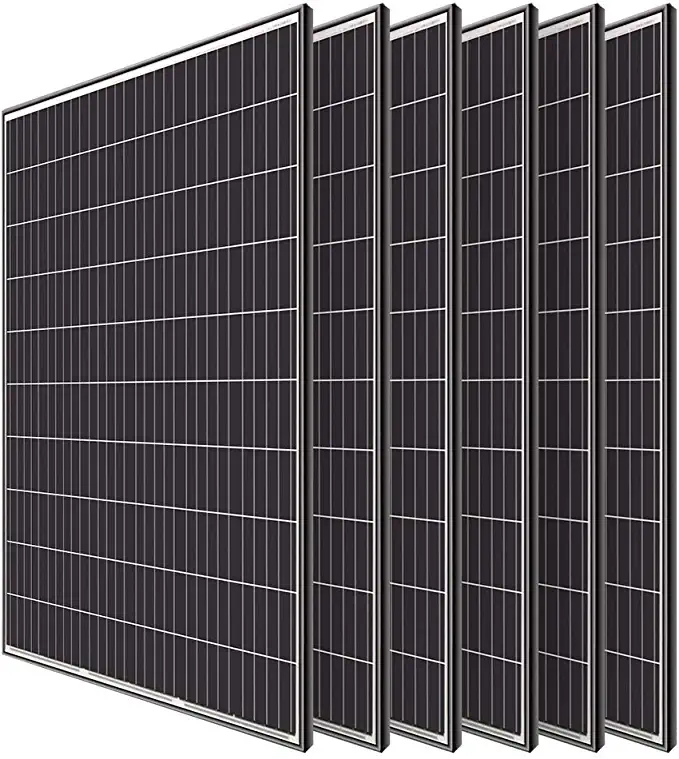
- 320W/24V monocrystalline solar panel kit
- Up to 21% efficiency
- 39.7 pounds per panel
- 2-year warranty
Pros:
- Great efficiency rating
- 6-panel kit
- Easy installation
- Competitive price point
Cons:
- Heavy panels
- Short warranty
- Battery backup, chargers and inverter sold separately
Renogy makes some of the most durable solar panels for your RV, cabin and mobile home. Customers claim that these panels offer some of the best value for money and that they are incredibly easy to install. The panels may be heavier and not suitable for all mobile home roofs, but they do not lack solar efficiency.
We recommend these for mobile home owners who have a sturdy structure and want to maximize production. With the output you can expect from these — around 2.5 kW per day — you could feasibly run an average mobile home that’s around 150 square feet, including appliances, lighting, electronics, and some heating and cooling systems. Combined with batteries, this kit could easily bring you totally off-grid and power your mobile home indefinitely.
For those who need a lot of solar panels, Renogy offers a pack of 30 panels for a competitive price. This may be a good option for mobile home communities who want to split the panels and the bill and take on solar together.
ECO-WORTHY 1200W Complete Solar Panel Kit
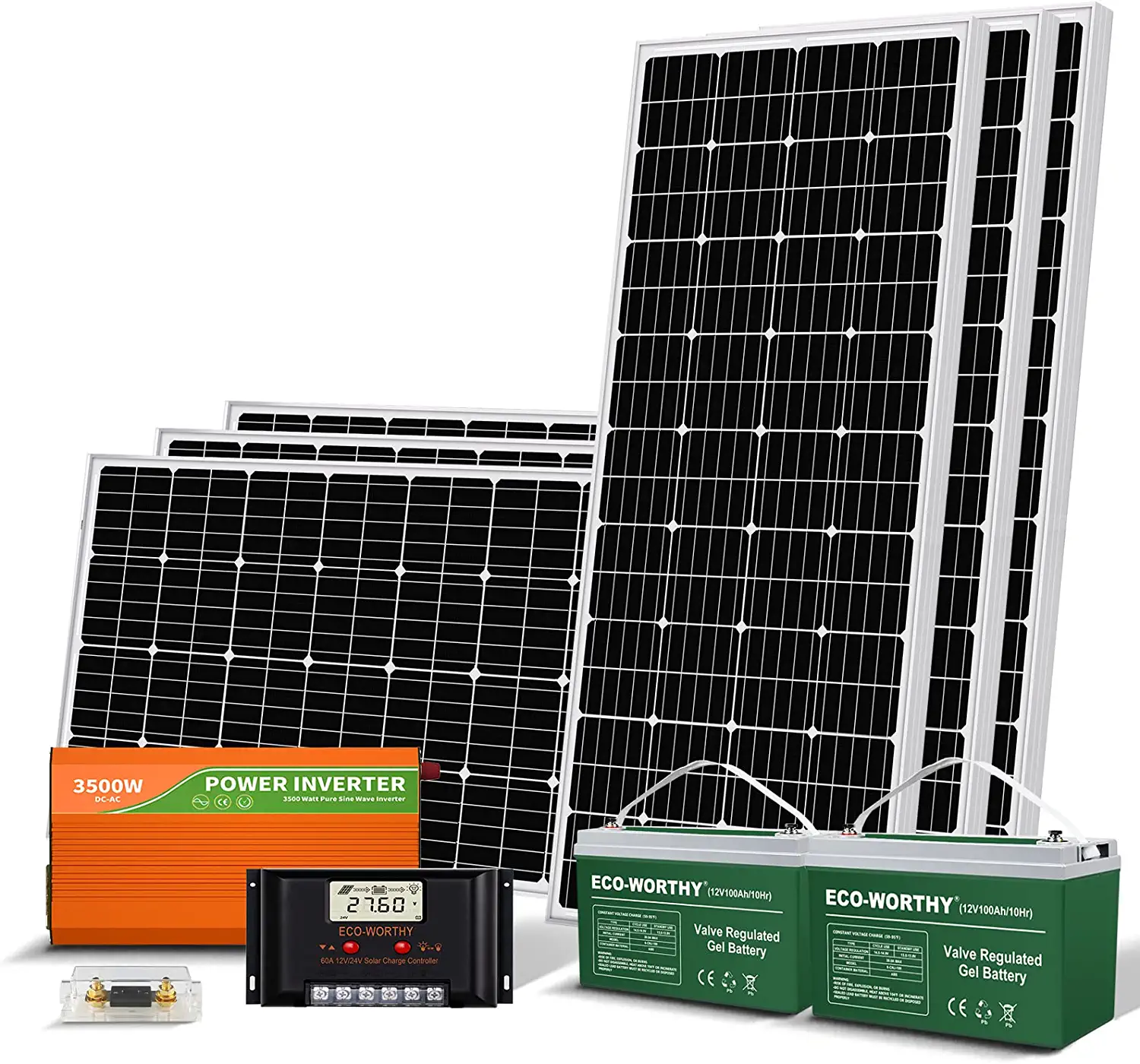
- 1200W/24V panel kit
- Up to 21% efficiency
- 29 pounds per panel
- 1-year warranty
Pros:
- Complete system includes six 195W panels
- Lithium battery bank and inverter included
- 60A solar charge controller included
- Competitive price point
- Customer support
- Easy DIY installation
Cons:
- Short warranty
- Heavier panel weight
The Eco-Worthy 1200W complete solar panel kit comes complete with two 100AH lithium batteries and a 3500W off-grid converter. This kit comes with everything a DIYer needs to set up their home solar. Designed to provide stable AC, these solar panels are perfect for powering your everyday appliances.
With 100AH batteries, you could power an RV air conditioner for around 45 minutes to an hour without any additional input from the panels. You could also power a mini fridge for over 24 hours, and lighting for about a week without additional input. This makes this kit an outstanding option if you expect to be in low-light conditions or want the flexibility to maintain electricity for long periods, even when the sun isn’t shining.
The panels are also quite heavy, so you should still be cautious of adding too many rooftop panels. These solar panels only come with a one-year warranty, but the batteries are built to last over tens years each.
HQST 100W 12V Flexible Monocrystalline Solar Panel
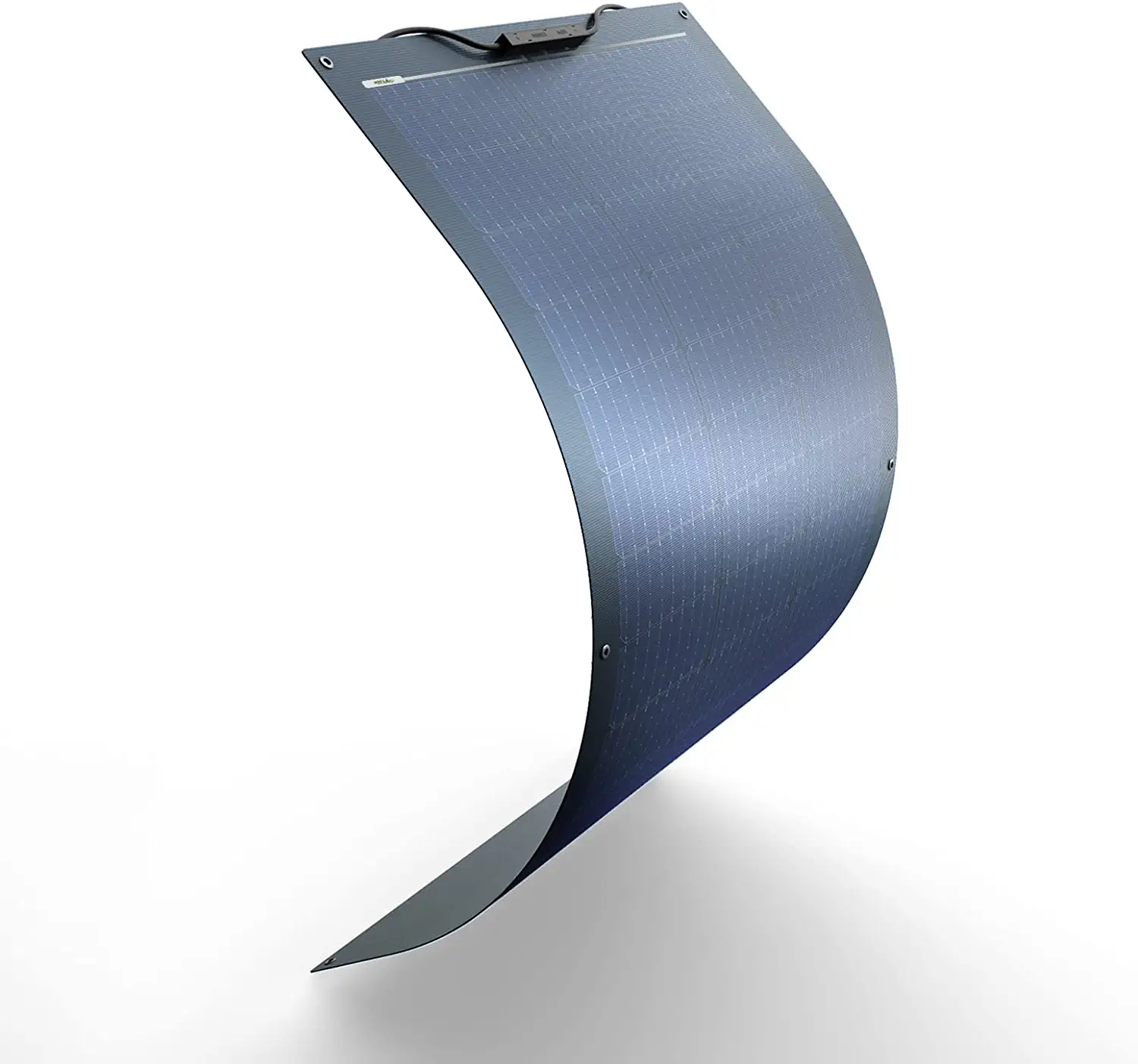
- 100W/12V monocrystalline solar panel
- Up to 23% efficiency
- 5.3 pounds per solar panel
- 25-year warranty
Pros:
- High-quality material
- Ultra-lightweight
- High efficiency
- Easy installation
- Excellent warranty
- Low price point
Cons:
- Low power (only 100W)
- Solar battery, controller and inverter to be purchased separately
As the most lightweight option of all the solar panels listed, the HQST 100W panel is ideal for any roof structure. This panel can flex to fit any surface and is perfect for cabins, RVs, boats and mobile homes. Installation is a breeze due to the pre-drilled mounting holes and silicone adhesive.
At only 100W, it would be difficult to power an entire mobile home with only these panels. You’d need around 50 of these panels on a 600-square-foot mobile home, or around 10 to 15 on a standard RV, making it implausible to get all of the electricity you need from these panels. We’d recommend these most to mobile home owners looking to supplement power and charge solar batteries to maintain power through the night. If you want to be off-grid all day, choose a more powerful panel with a higher output.
However, they do come at a low price per unit, so buying in bulk is feasible. This solar panel does not come as a kit, so you will also need to purchase other solar equipment to use these panels. As such, we’d only recommend these if you have some experience with DIY solar. It’s easy to buy the wrong wires, chargers, and batteries, which means you could end up spending more than you need to on additional equipment.
Pros and Cons of Mobile Home Solar Systems
There are some solar companies that will install solar panels on mobile homes, such as Mobile Home Energy and Sunco Solar, but due to strict building regulations and structural limitations, not all mobile and manufactured homes are eligible for rooftop solar.
That doesn’t mean that mobile homeowners can’t have solar power or benefit from incentives and the federal solar tax credit. It simply means that you have to either rely on partial solar power or get creative with your solar panel placement.
How to Know if Your Mobile Home Can Have Solar Panels
Although the best way to determine if you are eligible for solar panels is to contact an installer or have someone inspect your home, you can better understand your eligibility if you read the sections below.
Age of Your Mobile Home
One of the first roadblocks that mobile homeowners must overcome is the age of their mobile home. If a mobile home was manufactured after 1990, they likely have the right electrical for solar panels.
But if your mobile home was manufactured before 1990, you may run into problems with your electrical system. This is because some of the older manufactured homes don’t have the necessary hookups for installing photovoltaic units.
Compatibility with the Electrical Grid
If you live in a mobile home connected to a community electrical grid, it’s unlikely that you can install your own solar panel system. This is because there’s no easy way to connect to public utilities without permission from your owner’s association. Additionally, your local electric company usually requires that a professional connect the system to prevent issues.
That’s not to say that getting permission is impossible, it just requires more steps. In any case, it’s much easier to install home solar if you’re independently connected to the electric grid.
Structure and Design of Your Roof
The square footage of your roof is not generally a problem, but many mobile home roofs are not strong enough to support heavy solar systems. Many of the newer mobile homes have the roof structure and even the metal shingles to support solar panels, but some of the older roofs were not built to support such weight.
Newer mobile home roofs already have a steep pitch that allows solar panels to harness enough sunlight to run at optimal levels. But if your mobile home has a flat roof, this can be a problem because some solar panel kits come with mounts that can only be installed on slanted rooftops.
In addition to the structure of your roof, you must also have a permanent foundation. Mobile homes without foundation can only support a few solar panels on the roof and exterior walls, and even then, it’s usually thin-film panels, which are light and have a lower output. To check whether your home can support rigid solar panels, you should look up local building codes and get an inspection.
How Many Solar Panels Do I Need For My Mobile Home?
On average, mobile homes use an annual 9.1 kilowatt-hours of electricity per square foot2. The average mobile home ranges from 600 to 1300 square feet, and the table below shows approximately how many 100- to 300-watt solar panels you would need to completely offset your electricity bill.
The more wattage that a solar panel is able to produce, the fewer solar panels you will need to install. So if you want to save roof space, you’ll want to look into higher-watt panels. Just keep in mind that these tend to be heavier, so you might run into weight constraints.
| Mobile Home Square Footage | Average kWh Used | Average # of 100 Watt Solar Panels Needed | Average # of 300 Watt Solar Panels Needed |
| 600 sq. ft. | 5,460 kWh | 41 | 6 |
| 800 sq ft. | 7,280 kWh | 55 | 8 |
| 1000 sq ft. | 9,100 kWh | 68 | 10 |
| 1200 sq ft. | 10,920 kWh | 82 | 12 |
The size of your home is a good place to start, but it’s not always the most accurate indicator of how much energy you use. The more important indicators will be both your solar energy goals and your average household energy consumption. So, ask your energy provider for a summary of your monthly energy usage to get a better idea of how much you use.
Where to Install Your Solar Panels On Your Mobile Home
Because not every roof is able to withstand the weight of 100- to 200-pound solar panels, you sometimes have to get creative with your panels’ placement. Most mobile home solar panels are mounted to the roof, attached to the side of the home or staked in the ground.
Mobile Home Roof
If you have a mobile home with a slanted metal roof, you might be a candidate for roof-installed solar panels. However, not every mobile home has a suitable roof for solar panels. Before installing solar panels, homeowners should look at their local zoning regulations, homeowner association and the electrical system within their roof to ensure their solar system can be supported.
Ground-Mounted Solar Panels
Ground-mounted solar panels are a great option when rooftop solar systems are unsafe. These solar panels are often staked right into the ground and can easily be directed to angle towards the most direct sunlight. This allows you to benefit from renewable energy without the threat of your roof collapsing.
Siding, Awnings and Other Structures
If the roof is not an option and you don’t have the space to stake your panels, you can also attach the solar panels to the side of your mobile home. This option may not be ideal for direct sunlight, but it offers a way to harness some sunlight.
Other mobile homeowners have built awnings, pergolas and other attachments to their homes to offer more square footage for solar panels. Many solar panels require permanent installation, so know that these structures will have to be built to stay.
Alternative Energy Efficiency Upgrades
Unfortunately, not every manufactured home can support a solar system. These sustainable upgrades can also help you conserve energy and still save money on energy bills:
- Good insulation
- High-performance windows
- High-efficiency heating and cooling systems
- High-quality HVAC systems
- Efficient appliances
- Energy-efficient lights
Comparing authorized solar partners
-
- Industry-leading in-house financing
- Competitive pricing
- Excellent reputation
- Doesn't offer solar batteries (coming 2022)
A+Best Solar Financing2014Trina Solar, Canadian Solar, SolarEdge, Silfab, SunPower25-year manufacturer warranty; 10-year workmanship warranty, 2-year production guarantee
Having trouble deciding? Click below and use our process to receive multiple quotes instead:

 233k
233k  41k
41k  Subscribe
Subscribe 


